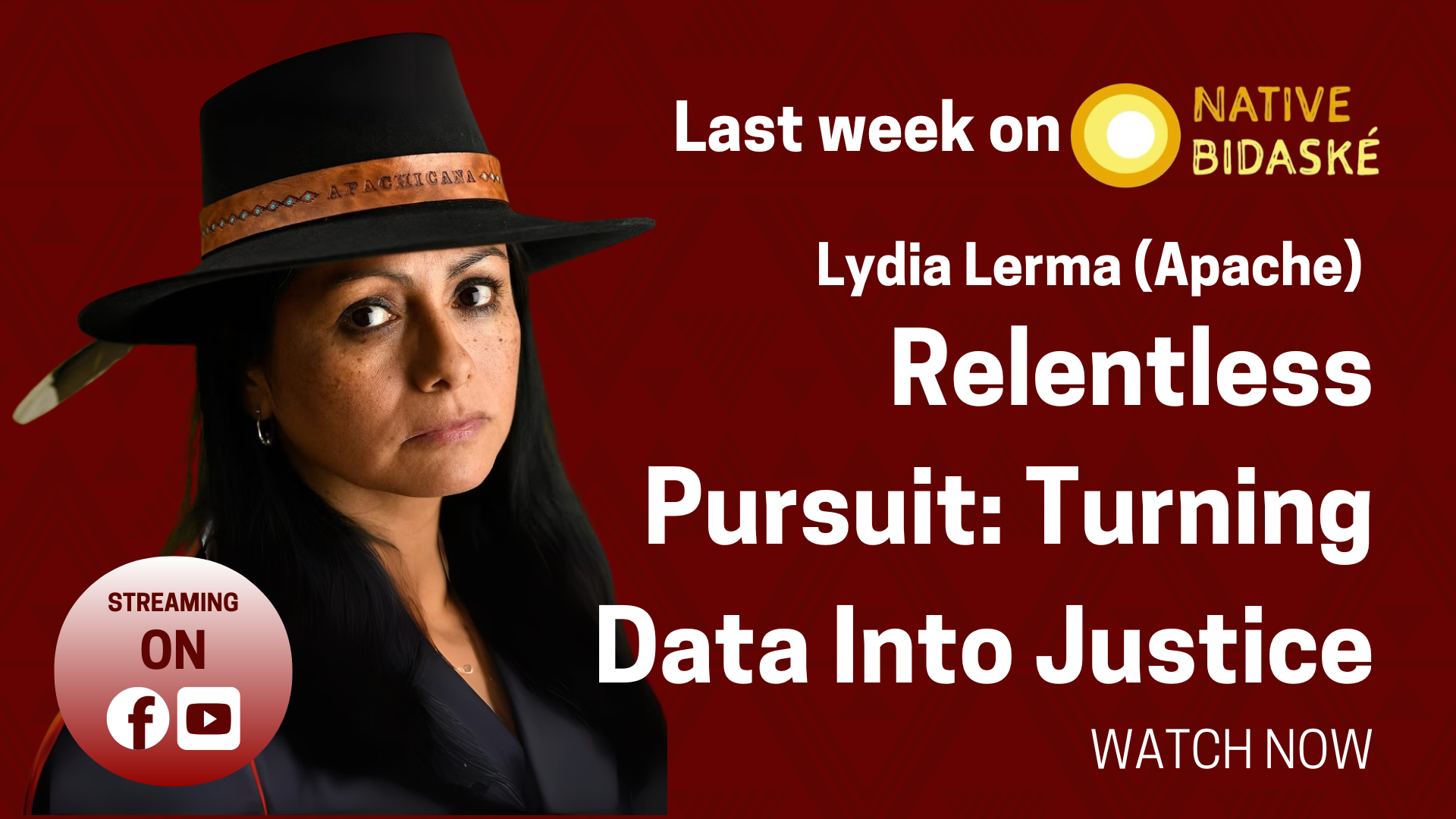
- Details
- By Native StoryLab
What happens when law enforcement refuses to act? For Lydia Lerma, a Lipan Apache mother and data analyst, the answer was to take justice into her own hands. On the latest episode of Native Bidaské, host Levi Rickert sat down with Lerma to hear how her fight for her son became a movement for many.
Rickert set the stage:
“Lydia Lerma, who is a Lipan Apache, was featured in a six-episode podcast this summer called The Hunter. The podcast hit number three on the Apple podcast channel. In the series, Lerma tells the story of how her son, who was sexually molested when he was only six years old, and how she traveled all the way to Mexico City using her own funds to bring justice for her son.”
Lerma explained the motivation that drove her:
“What went through my mind initially was it actually reopened up a bunch of wounds that I had for myself. I'm a sexual abuse survivor myself… when I found out what had happened to my son, it reopened all of those wounds, but it also provided the motivation for me to get justice… I did not want him to live the rest of his life carrying the weight on his shoulders of what had happened to him and not having some type of closure.”
Armed with her skills as a data analyst, Lerma dug into the case herself:
“I was very familiar with just pulling information from different resources and putting it all together, and I think that's what helped me in my social media campaign when I was tracking down the man that had abused my son.”
What she uncovered was chilling:
“I found evidence that he was a serial predator, that my son was not the first victim… Yes, it felt like I was on an episode of Dateline when they find the trophy chest of a serial killer. I am looking at pictures of victims. I'm looking at their artwork and personal belongings that he had taken as mementos. He took a baseball glove from one of his victims. He had one of his victims’ baseball hats. He had a cleat. He had pictures that these children would draw in school and bring home. He had so many different things from each of his victims. And I was shaking when I found it, and I couldn't believe what I was seeing.”
But even with this mountain of evidence, authorities did not act quickly.
“I actually had contacted law enforcement and told them this is what I found. But guess what? Nobody came to get that evidence… Nobody listened to me. And it wasn't until I went to the extreme of going to Guatemala, Mexico to track him down… and I spoke in front of the judge when he had been extradited back to the United States… At that point the media was in the courtroom, and that's when they picked up my case.”
Today, Lerma’s work continues through the Lydia Lerma Foundation, which supports survivors of sexual abuse and their families with resources, advocacy, and healing programs. Her story is not just about one fight for justice; it’s about creating visibility, building community strength, and refusing to let silence protect abusers.
🎥 Watch the full episode of Native Bidaské with Lydia Lerma to hear her powerful story.
Help us tell the stories that could save Native languages and food traditions
At a critical moment for Indian Country, Native News Online is embarking on our most ambitious reporting project yet: "Cultivating Culture," a three-year investigation into two forces shaping Native community survival—food sovereignty and language revitalization.
The devastating impact of COVID-19 accelerated the loss of Native elders and with them, irreplaceable cultural knowledge. Yet across tribal communities, innovative leaders are fighting back, reclaiming traditional food systems and breathing new life into Native languages. These aren't just cultural preservation efforts—they're powerful pathways to community health, healing, and resilience.
Our dedicated reporting team will spend three years documenting these stories through on-the-ground reporting in 18 tribal communities, producing over 200 in-depth stories, 18 podcast episodes, and multimedia content that amplifies Indigenous voices. We'll show policymakers, funders, and allies how cultural restoration directly impacts physical and mental wellness while celebrating successful models of sovereignty and self-determination.
This isn't corporate media parachuting into Indian Country for a quick story. This is sustained, relationship-based journalism by Native reporters who understand these communities. It's "Warrior Journalism"—fearless reporting that serves the 5.5 million readers who depend on us for news that mainstream media often ignores.
We need your help right now. While we've secured partial funding, we're still $450,000 short of our three-year budget. Our immediate goal is $25,000 this month to keep this critical work moving forward—funding reporter salaries, travel to remote communities, photography, and the deep reporting these stories deserve.
Every dollar directly supports Indigenous journalists telling Indigenous stories. Whether it's $5 or $50, your contribution ensures these vital narratives of resilience, innovation, and hope don't disappear into silence.
 The stakes couldn't be higher. Native languages are being lost at an alarming rate. Food insecurity plagues many tribal communities. But solutions are emerging, and these stories need to be told.
The stakes couldn't be higher. Native languages are being lost at an alarming rate. Food insecurity plagues many tribal communities. But solutions are emerging, and these stories need to be told.
Support independent Native journalism. Fund the stories that matter.
Levi Rickert (Potawatomi), Editor & Publisher
